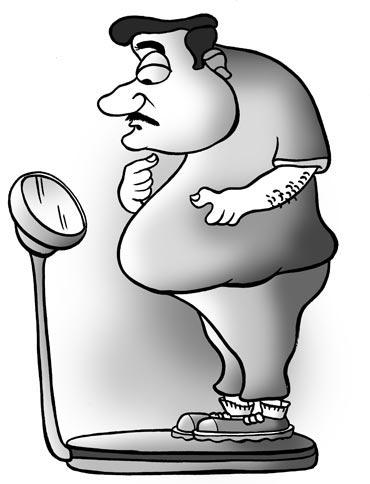 | « Back to article | Print this article |
All about bariatric surgery to reduce obesity
Bariatric surgery may seem like a boon to a lot of overweight people but there are some things you must keep in mind before going under the knife.
Recently, BJP President Nitin Gadkari who was suffering from Type II diabetes went in for gastric bypass surgery, a type of bariatric surgery, which helped control his sugar levels.
If you're one of those who's tried everything from dieting to gymming to power yoga and still can't seem to lose those extra pounds, you might want to consider bariatric surgery before things get more serious.
What is this surgery all about you ask? We spoke to a few doctors from reputed hospitals all over India to tell us more about this weight loss surgery. Here are a few things you must know.
How does it work?
Bariatric surgery is a weight loss surgery performed on people who are considered to be obese. The idea behind it is to reduce the capacity of the stomach so that the patient feels easily full after consuming small meals leading to weight loss.
"There are quite a few procedures under bariatric surgery. The three common ones are Gastric banding, Gastric sleeve and Gastric bypass.
Gastric banding is when a silicon band is placed on the upper part of the stomach making a small pouch. This restricts the size of the stomach opening and thereby reduces food intake.
In Gastric sleeve, 80 per cent of the stomach is removed and the new tiny stomach absorbs the nutrients.
Gastric bypass on the other hand involves making a small pouch of the stomach and connecting it to the small intestine.
Around 250 cms is bypassed which doesn't allow 100 per cent absorption of the food," says Dr Rajesh Khullar, Senior Consultant, Minimal Access, Metabolic and Bariatric Surgery at Max Healthcare, Delhi.
Many people tend to get confused between bariatric surgery and liposuction. Liposuction is a a cosmetic surgery is merely for fat loss as opposed to bariatric surgery which results in sustainable weight loss.
Dr Ramen Goel, Bariatric surgeon at Fortis Hospital, Mumbai clears the air, "Liposuction is for people who want to remove fat from a particular part of their body. The fat eventually comes back in most cases. For long term weight loss, one must opt for bariatric surgery."
Should YOU go for this surgery?
Bariatric surgery isn't for just anyone who wants to lose weight. The person's Body Mass Index (BMI) must exceed 37.5. This threshold is reduced to 32.5 for those suffering from weight related problems.
There's a lot more than just the BMI of the person, which decides whether he/she can get operated.
"Before we subject the person to bariatric surgery, we make sure that he is in the position to follow instructions post surgery. This surgery requires patients to be ready for a lifestyle modification and one needs to be committed to do so. It is also very important to see if the patient has made attempts to lose weight in the past," says Dr V Baskaran, Surgical Gastroenterology senior consultant at Apollo Hospitals, Bangalore.
Benefits of Bariatric surgery
Bariatric surgery results into a lot more than just weight loss.
Post surgery, you can bid goodbye to all those weight related problems that have not been letting you lead a healthy, tension-free life.
According to Dr Muzaffal Lakdawala, Founder, Centre for Obesity and Diabetes Support (CODS), "This is the only surgery that treats all weight related problems -- hypertension, diabetes, high cholesterol, sleep apnea, knee and joint pains among many others.
This eventually leads to an increase in life expectancy. You can also expect a reduction in your medicine intake after this surgery."
Risks of Bariatric surgery
Like every surgery, there are a few risks associated with this one too. However, there is less than one per cent chance of things going wrong with this surgery. "The risks include reaction to anesthesia, possibility of leakage following gastric bypass surgery, staple lines opening up in cases where the stomach is stapled. These cases are avoidable provided the surgery is tackled efficiently" says Dr Ramen Goel.
Life after surgery
After getting operated, the patient should be prepared for a lifetime association with the surgeon and stick to his/her guidelines.
Though he's not on a diet, binging is a complete no-no. Many suffer from some deficiencies after the surgery, which is why they must have high protein diets to make up for them. A few people are also recommended to take certain supplements for a while.
Success stories -- been there, done that!
We spoke to a few people who underwent this surgery and asked them how life has been post surgery. Here's what these happy souls had to say.
26-year-old Simran Choithramani is all praise for bariatric surgery. Simran, who used to be a good 111 kgs, now weighs 75 kgs and is as healthy as ever.
"I was highly overweight for my age. I had tried everything to lose weight. I met dieticians, went to the gym and tried all kinds of diet plans but nothing worked in my favour.
It was such a serious problem that it was slowly pushing me to depression and I had also contemplated suicide" she says.
Her weight was leading to other health problems and that's when she decided to undergo bariatric surgery in February 2011.
"I was doubtful about the surgery initially but now I'm glad I did it. Life took a full 360-degree turn post surgery. I'm filled with positivity now and I feel way happier" says a more confident Simran.
"I used to find it difficult to walk, climbing stairs was a pain, my knees used to give me problems and what not!" says 57-year-old V Balasubramanium who was suffering from high blood pressure and diabetes before his surgery.
Bariatric surgery being the last option to get rid of these health issues, he decided to go for it in January 2010 and ended up losing around 50 kgs!
"Life has changed no doubt! My medicines have reduced by one third. I'm able to do a lot more and I feel more energized. My eating has also reduced because I start feeling uneasy if I eat too much" says he. Even though bariatric surgery is an option, he thinks it should be done only if the situation can't be helped at all.
"It's always better to control eating from the very beginning than to reach a stage where you need to turn to weight loss surgeries. Keep a check on your weight because weight gain brings with it many other health problems," he says in retrospect.
'The surgery was a life-changing event'
Till October 2010, Dr Kunjal Dharod found herself suffering from hyperthyroidism and Poly Cystic Ovarian Disease (PCOD).
She was overweight, which became a huge cause for embarrassment and interfered with her day-to-day activities. Her parents wanted her to get married, her profession needed her to be more agile but she felt she couldn't do anything to improve the situation.
One year and a surgery later, this 23-year-old finally found peace. "The surgery was a life-changing event. Every little thing in my life changed!
I can work faster, I feel more efficient, I got rid of my PCOD and my thyroid levels have considerably reduced too" says Kunjal who's soon to be engaged.
She managed to shed 30 kgs and weighs about 68 kgs now.
"My appetite has decreased and I try to stay away from soft drinks and sweets. Whoever introduced this surgery is no less than a magician! I can't be grateful enough!" says she.
57-year-old, Darius Dastoor was 'morbidly obese' when he got his surgery done in 2009. He used to suffer from diabetes, gout and hypertension.
After the surgery, all his ailments disappeared and he managed to lose a whooping 100 kgs! "There's just one word for life after surgery and that's, well, rocking!
From being a lethargic and listless person, I turned into a jumping, happy person. I couldn't have asked for more!" exclaims Darius.
He eats more sensibly now and tries to avoid rice and potatoes. According to Darius, "Anyone who is super obese should consult a doctor and go for this surgery! It's highly effective and I totally recommend it."
Mumbai-based Anandi also underwent this surgery in 2010 after getting tired of fighting with diabetes.
"I wanted to be lighter, more mobile and enjoy life better. I lost around 30 kgs and now I feel I have regained the lost stamina and I'm able to live a happier life," says this 61-year-old.
Bariatric surgery helped Anandi to get rid of diabetes and she does all that it takes to make sure it stays that way.
"Post surgery, I take the necessary precautions to not let my diabetes revive. I keep away from sweets and I have become more cautious about what I eat," says Anandi.
She also adds, "It's very important to follow the doctor's advice and go for regular check-ups after the surgery. And yes, I would say that bariatric surgery is absolutely worth it."



